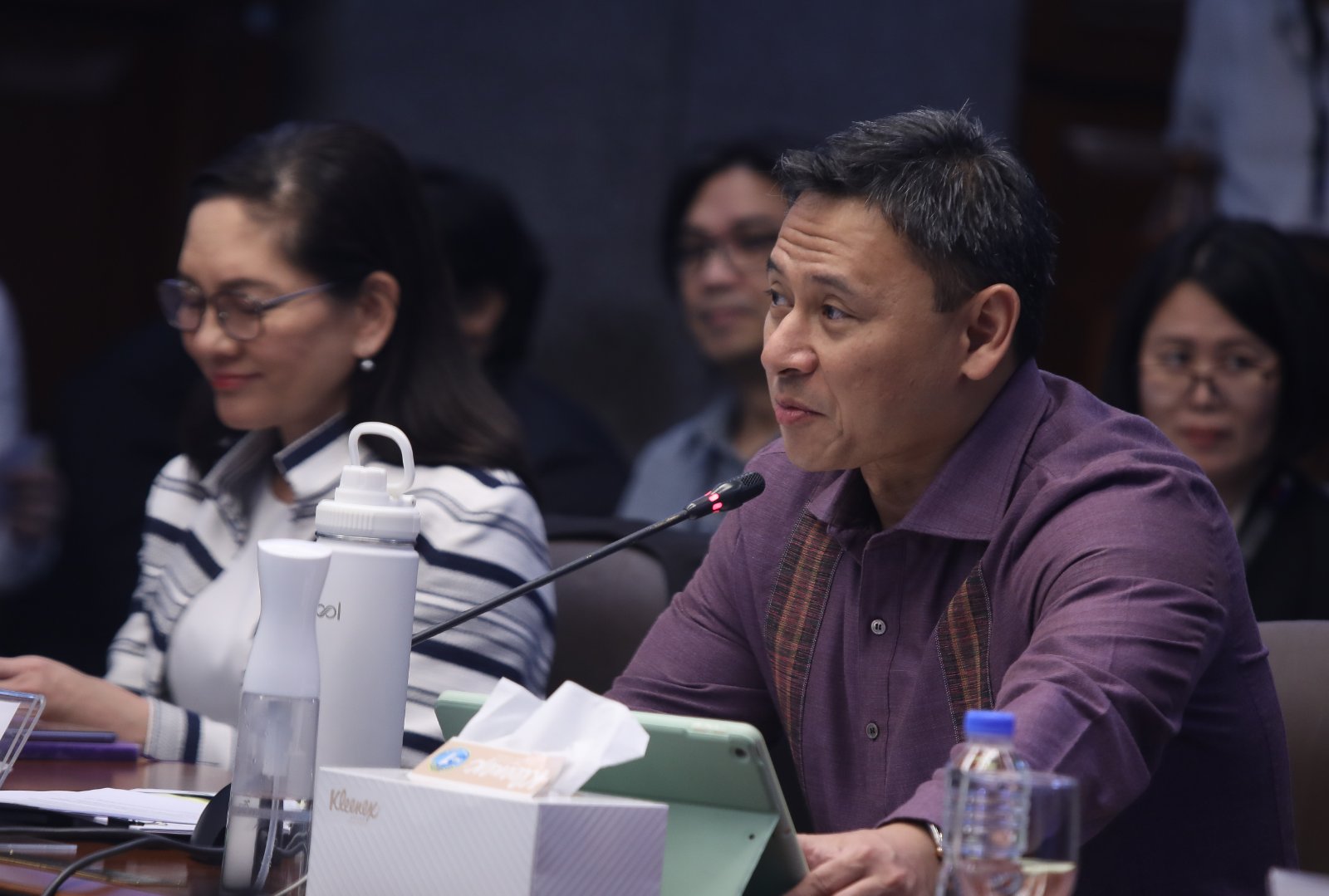Basic education should remain under Philippine control—Angara
The country’s basic education sector should be kept under the control of Filipinos as local schools and institutions play a critical role in preserving and instilling Philippine values and shaping the youth.
 Sen. Sonny Angara, at the continuation of the Senate Subcommittee on Constitutional Amendments and Revisions of Codes on Tuesday, Feb. 20, 2024, explains that the intention of Senate Resolution of Both Houses No. 6 is to keep basic education in the hands of Filipino ownership and only the ownership, management and control of higher education institutions (HEIs) will be considered. (Senate PRIB Photo)
Sen. Sonny Angara, at the continuation of the Senate Subcommittee on Constitutional Amendments and Revisions of Codes on Tuesday, Feb. 20, 2024, explains that the intention of Senate Resolution of Both Houses No. 6 is to keep basic education in the hands of Filipino ownership and only the ownership, management and control of higher education institutions (HEIs) will be considered. (Senate PRIB Photo)
Sen. Juan Edgardo “Sonny” Angara cited the need to uphold this during the continuation of the Senate subcommittee on Constitutional Amendments and Revision of Codes’ hearing into Resolution of Both Houses No. 6, which seeks to amend certain economic provisions in the 1987 Constitution.
“The intention is to keep basic education in the hands of Filipinos,” Angara said echoing the sentiments expressed by Senate President Juan Miguel “Migz” Zubiri and Senate President Pro Tempore Loren Legarda.
Angara, Legarda and Zubiri authored and filed RBH 6 which proposes to open up higher educational institutions to one hundred percent full foreign ownership, among others.
“As (the late Commission on Human Rights Chair Chito Gascon) says in the records, Filipino schools and Filipino-owned institutions play a very important part in the instilling of values and the molding of Filipino youth,” Angara said citing the perspective of the former human rights advocate, who also served as the youngest member of the 1987 Constitutional Commission.
“So I think we want to maintain that societal or public goal, and we're looking at really, we're considering the possibility of amending the constitutional provision, which currently allows a 60-40 arrangement,” Angara said.
The senator said it is imperative to ensure greater precision in the language of any proposed amendment to the constitutional provision on the ownership or management of higher education institutions (HEIs).
Angara said the need to clarify the scope of amendment is necessary amid its potential impact on basic education.
“Before we amend or seek to amend the constitutional provision on ownership or management and control of higher education institutions, perhaps we should aim at greater precision in the language of the amendment,” Angara stated.
Private schools cautioned vs full foreign ownership
Also during the Senate hearing, the Coordinating Council of Private Educational Associations (COCOPEA) echoed Angara’s point of view, as they also emphasized the need for private institutions to safeguard Filipino culture, values and interests amid the Charter change discussions.
“We respectfully urge lawmakers to proceed with caution regarding introducing amendments to the pertient provisions because this will have a long-standing complicated repercussions or implications to the Filipino generations to come,” COCOPEA president Fr. Albert Delvo told the Senate subpanel.
COCOPEA, Delvo said, is cautious about the potential risks of permitting full foreign ownership of educational institutions as this may indeed be “prejudicial to Filipino values.”
“We are cautious because if we allow foreigners to control, own, and administer the institutions, it may be prejudicial to our Filipino culture, values, morals, spiritual matters. They may be in danger,” Delvo said.
Delvo also pointed out that some institutions currently operating under a 60-40 agreement seem to be already satisfied with the current setup.
Former Commission on Higher Education (CHED) chairperson Patricia Licuanan also questioned the necessity of amending the economic provisions, especially on the part concerning ownership of educational institutions.
Licuanan pointed out partnerships and technology transfer has a crucial role in driving innovation, but “nowhere does it prove to me that (foreign) ownership is necessary.”
“I do not favor amendments to restrictions on foreign ownership of educational institutions at any level,” Licuanan said.
Nevertheless, she said “partnerships could and should be developed further without Charter change.”
According to Licuanan, while foreign universities could be attracted to the Philippines’ large youth population, they would soon discover that branch campuses in the country would not be sustainable.
Licuanan also urged the Senate subpanel to consider the Second Congressional Commission on Education’s (EDCOM II) report and its view on foreign ownership.
“So far, its over 300-page first year report spells out in no uncertain terms the dimensions of the crisis in Philippine education, but does not even hint at a need for change in the policy on ownership of schools to address these problems,” she said.
Philippines has strict restrictions on education
EDCOM II executive director Karol Mark Yee, meanwhile, told the panel that based on a study on foreign ownership policies in the ASEAN region, the Philippines has one of the strictest restrictions—both in basic and higher education.
“Based on our research, within ASEAN, only the Philippines has foreign ownership, establishment, and enrollment restrictions stipulated in the Constitution, whereas other countries only indicate this via legislation,” said Yee.
Despite the restrictions, Yee said there is a need to explore avenues for attracting foreign investment in the education sector, and allowing foreign ownership would be “just the first step” and requires additional legislation.
Likewise, Yee stressed the importance of regulatory capacity-building within government agencies, particularly the Department of Education (DepEd), CHED, and the Technical Education and Skills Development Authority (TESDA).
“There’s a need to strengthen the capacity of DepEd, CHED and TESDA to regulate the possible entry of poor quality institutions,” Yee said.